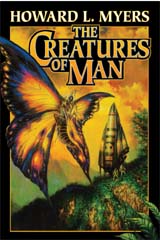
Howard L. Myers is almost completely forgotten today, although some people can still be found who remember the name "Verge Foray," under which he published many of his stories. But in the brief time his writing career lasted, from 1967 to 1971, he was a prominent figure in science fiction.
It's a sad tale. Myers was born in 1930, and published his first science fiction story at the age of twenty-two. That was "The Reluctant Weapon," published in the December 1952 issue of Galaxy. (The story is included in this volume.)
And . . . that was it, for another fifteen years. Why? We don't know. For whatever reasons, it wasn't until Myers was in his late thirties that he began writing again. And once he did, the stories practically came pouring out—and almost every one of them excellent. His stories appeared in most of the premier science fiction and fantasy magazines of the day—Analog, Galaxy, If, Amazing, The Magazine of F&SF—and he seemed on the verge of becoming one of science fiction's top authors.
We'll never know. In the summer of 1971, against the advice of his mother, Howard Myers took a vacation to Florida. The combination of the heat and his medical condition combined to give him a massive heart attack which killed him. He was forty-one years old.
There have been other science fiction writers struck down in their prime, of course. Henry Kuttner and Cyril Kornbluth immediately come to mind; or Keith Laumer, who survived the stroke he suffered in his mid-forties, but was never the same writer afterward; or Randall Garrett, whose mind was destroyed in his early 50s by a viral brain infection. But at least those writers had enjoyed long and successful careers before the end came. That we can think of, only Stanley G. Weinbaum and Rosel George Brown suffered the same fate as Myers: felled, just on the eve of triumph.
There's something horribly poignant about it; as if Achilles, stepping ashore outside the walls of Troy, had lost his footing and drowned in the surf.
So be it. Achilles was a noted warrior even before the Trojan war, after all. And whatever Howard L. Myers might have become, what remains is what he did accomplish. And that was no small thing. In four short years, he produced a body of work which, though small in comparison to that of writers with longer careers, certainly does not suffer in terms of quality.
One novel, Cloud Chamber. Two, really, if we count the novellas "The Infinity Sense" and "The Mind-Changer" as parts of a single story—which is how Myers intended them to be read.
A cycle of stories, usually called the "Econo-War series" but actually part of a broader framework, which are unique in science fiction. (The entirety of it, which we've titled "The Chalice Cycle," is included in this volume.)
And almost twenty other stories, ranging from the chilling "Fit for a Dog" to some of the wittiest science fiction stories ever written.
So, we invite you to make the acquaintance of an author who, had it not been for misfortune, would have been a well-known name in science fiction. And, who knows? Hopefully, this volume will go a long way toward restoring a reputation which deserves to be.
—Eric Flint
—Guy Gordon
January 2003